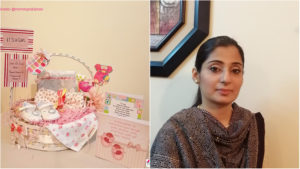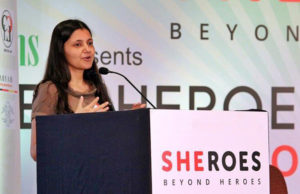Thirty-one-year-old Kriti Gupta of Jaipur has a busy morning ahead. She needs to get her daughter ready for school while her toddler demands her attention. Amid this hustle, Gupta’s phone chimes. It’s an Instagram notification.

One of her clients has left a thank-you message for the timely delivery. Gupta is a social media entrepreneur who has built a credible brand of customised soaps and toiletries.
Nearly 500 miles away in Karachi, Sara Zafar Mir, a Kashmiri married into a Pakistani family, is equally busy. She specialises in premium baby products. Facebook is her social media platform. Every day, she reaches more than 150,000 followers, all potential buyers for her customised baby clothes and postpartum care packages. She is also the mother of two pre-teens children.
“I am blessed to have a supportive husband and in-laws, who go out of their way to help me. Both my kids help me in my business too,” Mir confides.
Both Gupta and Mir may be separated by the India-Pakistan border, but their similarities far outweigh their differences. They both belong to a new generation of South Asian boss ladies who are taking social media by storm by creating unique online businesses.

Over 4.26 billion people use social media worldwide, a number projected to increase to almost six billion in 2027. That’s where a new, dynamic market is emerging and South Asian women entrepreneurs are here to reach that whole new world of consumers breaking patriarchal norms long dominant in South Asian communities.
Says Gupta, “My Insta-shop is open 24×7. Living in a joint family I have realised that everything is manageable if you have a good mother-in-law. I am blessed.”
Born and brought up in Bangkok, Gupta dropped out of journalism school to have her dream wedding. Soon, she had her first child, and her career took a back seat.
It was on her daughter’s fifth birthday in 2020 that she kickstarted her entrepreneurial journey by starting Bath and Bubble Co, a brand that sells handmade, natural, artisan soaps and bath products.

Mir was a teacher before she got married. As a young mother found herself searching for premium baby products and felt that there was a void to be filled. “I realised that Karachi has some very good quality products which you don’t find in other cities.”
That led her to start Mummy and MiniMe, which is almost like her third baby.
She explored the internet and found that there were not a lot of people in Pakistan who offered quality products at affordable prices. “My goal was to provide affordability and uniqueness. We began with PKR 25,000 at the time, which is not a lot of investment,” she added.
Mummy and MiniMe currently has 157,673 people following on Facebook and 4,782 followers on Instagram.
Apart from baby products she also began curating wooden toys. With time, the online space started becoming saturated. Many new businesses popped up online and the online market became competitive.
“In 2017, I realised that we need a new strategy. So, we began offering baby gift baskets for newborns. This is now a favourite among our customers. Mostly grandmothers, aunts, and friends are ordering these.” Mir then started collaborating with bloggers on social media to promote her products.
 The business model
The business model
Gupta sells through Instagram offering over 25 varieties of exclusive, natural soaps. Her personalised hampers are a huge hit and are often ordered in bulk for special occasions. Since creating a website or an offline store would require a huge investment of money and time, she decided to stick to the social media. Gupta informs.
The visual format on Instagram has helped business owners like Gupta to connect with her customers in a better way. She claims it is easier to track her customers on a real-time basis on social media and immediately find out what is working for them.
In Pakistan, Mir’s business has now reached a stage where she earns a decent living since she first began in 2013. The revenue spikes during Eid but even otherwise her business is consistent.
Since it takes time to build trust among customers online, many first-time buyers pay through cash on delivery but the majority of her customers make online payments. Due to her regular and direct engagement with customers online, Mir’s business rarely sees any returns or exchanges.
 “It’s hard work. You have to be consistent and patient. With time, we can get an idea who is going to continue ordering products and who is there just to window shop, just like a regular retail shop,” Mir says.
“It’s hard work. You have to be consistent and patient. With time, we can get an idea who is going to continue ordering products and who is there just to window shop, just like a regular retail shop,” Mir says.
There are thousands of such women who use social media exclusively as their main marketplace, especially in South Asian countries.
The rise and rise of social media
Economies worldwide have been disrupted by the pandemic, but it has also created new opportunities to do business through social media. Women-owned businesses have received a big boost in recent years. And with a second income coming in, the standard of living of most families has improved. This means the women are not only being empowered financially, but are also getting family support and acceptance for their role as working women.
Says Sairee Chahal, founder of “Sheroes”, India’s first women-only social media network, “When I started Sheroes, there were maybe 10 million women online in India. Today, there are 350 million women who are online, who have tasted the internet at least once and there’s an increasing number of women who are using this to their advantage.”
Chahal started her first company in 1999 as a first-generation entrepreneur.
For women in a patriarchal setup, running a business requires much more than entrepreneurial skills. There are many family dynamics that women are expected to navigate and balance.

“Women are invisible in their societal setups, whether it’s families or the work that they do both at home and outside. It’s this recognition that is driving women online. You’re the handler of the content. So, this recognition more than other things is what makes a difference.” She adds that only 9 percent of women are in the formal workforce. That means that most women are left to fend for themselves.
Nighat Dad from Lahore, Pakistan, founder and executive director of Digital Rights Foundation has also closely tracked the trend of women using social media for their growing businesses in recent years. “Women who started online businesses have grown over the years. They started to have an online presence. A couple of years back, women were not confident about using these platforms for their businesses,” she says.
In Pakistan, Instagram has gradually become the preferred choice to run businesses replacing Facebook as the most popular platform. In 2019, Facebook signed a Memorandum of Understanding of its #SheMeansBusiness with Lahore Chamber of Commerce and industry to provide support in hands-on training, skills enhancement and resources to women.
This was a major step towards empowering women to become entrepreneurs. It is estimated that women’s earnings in Pakistan have increased by four percent compared to previous year. One of the reasons is start-ups owned by women, and social media has played a pivotal role in helping them grow their businesses.
While the pandemic put the traditional ways of business on hold, the online market was thriving. With social distancing and people working from home, more and more people shifted to social platforms.
Not all’s well in the digital universe
Social media has its share of challenges. The major issue that entrepreneurs like Gupta and Mir face is developing a sense of trust among customers since it is difficult to showcase the quality of products through just pictures and videos.
Another concern is the easy imitation of handcrafted products to sell at lower prices. This makes it difficult for micro-entrepreneurs to compete in the vast market.
The digital world can also be intimidating for some entrepreneurs who belong to a different generation. So, while it is a blessing for some women who have grown up with technology, it might not work for others who are still trying to get used to it.
There is also a serious threat to cyber security. Several entrepreneurs have found their accounts to be hacked causing them not just financial but also immense emotional loss.
Dad believes there are serious challenges and risks associated with online entrepreneurship. “All kinds of challenges these women face in terms of harassment, finances, and stumbling upon bad actors online and trusting them,” she adds.
She also emphasised how women who work online should be aware of their rights. “How safe their devices are, how safe their platforms are, how much women know about digital security, and how strong are their passwords,” she added. Dad’s foundation has a toll-free number on its website to help women entrepreneurs in need.
Chahal uses her platform Sheroes to not only provide livelihood and financial support to women but also to offer crucial mental support to them. Over three million women have benefited from Sheroes’ counseling services. During the pandemic, Sheroes launched a digital bank called ‘Mahila Money’. The platform exclusively serves women who are not served by microfinance. Sheroes also acts as a marketplace for women where they can sell a range of items online.
Is this the beginning of a new revolution?
The rise of women entrepreneurs on social media is a global phenomenon attracting millions of dollars of investment.
In 2020 Facebook COO Sheryl Sandberg announced that the social media giant is investing $100 million to help 30,000 small businesses in over 30 countries. According to the latest statistics, there are 252 million female business owners in the world.
In 2021, Instamojo saw a 14.83 per cent spike in new female users in comparison to a five per cent drop in male new users. This shows that women are more eager to start their own businesses now and want to go online. Social media has enabled women to connect across boundaries, cultures, genders and has shown a positive trend where many women are comfortable establishing their businesses in a male-dominated society.
IBNS-TWF
(This report is part of a week-long cross-border reporting workshop held in Kathmandu, Nepal, organised by the US based East-West Center.)



